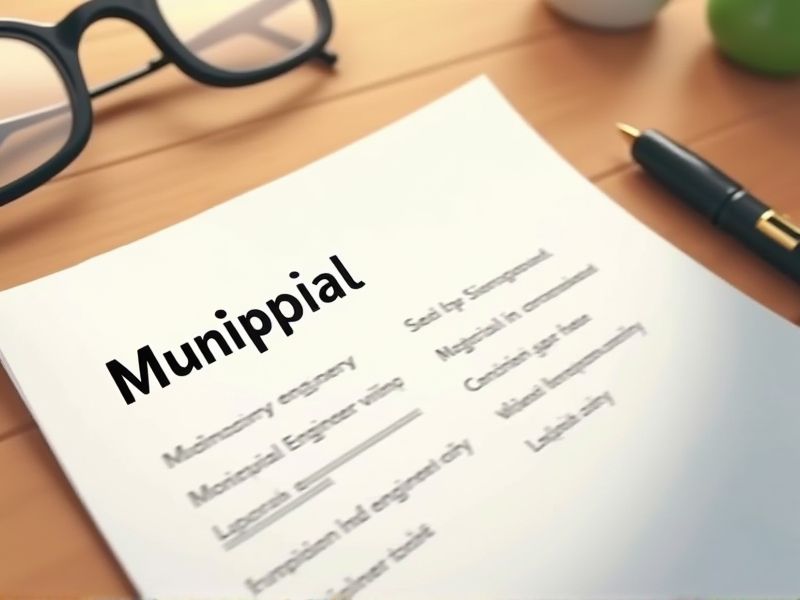
Municipal Engineers are responsible for designing and maintaining urban infrastructure, a role that requires comprehensive technical expertise and adherence to safety standards. Certifications ensure that engineers possess the necessary skills and knowledge to meet regulatory requirements and respond effectively to the evolving challenges of urban development. Certain certifications also facilitate professional growth by endorsing credibility and promoting adherence to industry best practices. Here are some important certifications you may need to pursue a career as a Municipal Engineer.
Professional Engineer (PE) License - Civil Engineering
A Professional Engineer (PE) License in civil engineering is needed for municipal engineers because it signifies adherence to safety and regulatory standards. Holding a PE license ensures that the engineer has met specific educational and experiential requirements, which is crucial for infrastructure projects like roads, bridges, and public works. It also grants the authority to sign off on plans and documents, which is often a legal requirement in many jurisdictions. The license establishes a level of trust and competence recognized by employers and the public, essential for community-focused projects.
Engineer-in-Training (EIT) Certification
Possessing an Engineer-in-Training (EIT) certification demonstrates a foundational understanding of engineering principles, crucial for ensuring quality and safety in municipal projects. The certification acts as an early marker of dedication to the engineering profession, which can reassure municipalities about adherence to industry standards. Having EIT status often enhances a candidate's competitiveness in job applications, providing an edge in securing municipal engineering positions. The EIT certification serves as a prerequisite step toward obtaining a Professional Engineer (PE) license, which is typically required for higher responsibility roles in municipal engineering.
Certified Municipal Engineer (CME)
The need for a Certified Municipal Engineer (CME) arises from the increasing complexity of urban infrastructure, which demands specialized knowledge to ensure systems are efficient and sustainable. Certification provides a standardized benchmark, confirming the engineer's expertise in handling municipal challenges like water management, road maintenance, and public safety. A CME's validated skills lead to improved project outcomes, which directly benefits community quality of life and resource allocation. Municipalities prefer CME holders for their ability to facilitate compliance with regulations and implement innovative engineering solutions, minimizing long-term operational costs.
LEED Accredited Professional (LEED AP)
A LEED Accredited Professional (LEED AP) enhances a municipal engineer's ability to integrate sustainable design practices into public infrastructure projects. This expertise improves project proposals during the planning phase, potentially increasing eligibility for green funding and grants. Municipal engineers with LEED AP credentials contribute to reducing the environmental impact of urban development projects. The presence of a LEED AP ensures adherence to green standards, which positively affects community health and resource efficiency.
Project Management Professional (PMP)
Municipal engineers often handle complex projects that demand coordinated efforts and precise execution; PMP certification equips them with the essential skills to manage these projects effectively. Project management principles from PMP help enhance resource allocation and risk management, crucial for municipal projects with tight budgets and regulatory constraints. With PMP training, municipal engineers can improve communication among stakeholders, ensuring transparent and efficient project progression. In a competitive job market, PMP certification adds a level of credibility and professionalism, increasing opportunities for career advancement within municipal engineering roles.
Certified Construction Manager (CCM)
Certified Construction Manager (CCM) certification enhances a municipal engineer's project management skills, ensuring efficient completion of infrastructure projects. Possessing a CCM demonstrates proficiency in industry best practices and up-to-date knowledge, minimizing risks associated with construction. A municipal engineer with a CCM is better equipped to manage complex projects, improving budget adherence and timelines. The certification also instills stakeholder confidence, promoting trust in public projects and fostering community support.
Geographic Information Systems Professional (GISP)
A Geographic Information Systems Professional (GISP) enhances municipal engineering by providing spatial analysis to improve infrastructure planning and resource allocation. Accurate mapping and data visualization from GISP support better decision-making in urban development and zoning regulations. GIS technology aids in risk assessment for infrastructure by highlighting flood zones and areas prone to natural disasters. Integrating GIS expertise helps optimize maintenance schedules and minimize long-term costs for public works projects.
Traffic Operations Engineer (TOE) Certification
Municipal engineers are responsible for designing and managing roadways that ensure safe and efficient traffic flow within communities, and a Traffic Operations Engineer (TOE) certification provides them with specialized knowledge in traffic management principles. Acquiring TOE certification demonstrates an engineer's proficiency in addressing complex traffic challenges, which can reduce congestion and enhance road safety. Certified engineers also stay informed about the latest technological advancements and industry regulations, ensuring compliance and innovative solutions are applied within municipal projects. Municipalities benefit from employing certified professionals because it increases public trust and can facilitate smoother project approvals and funding allocation.
Certified Water Professional (CWP)
Demand for Certified Water Professionals in municipal engineering correlates with the increasing complexity of water management systems and regulatory requirements. Their expertise ensures compliance with environmental laws, mitigating risks of costly fines or legal action. Municipal engineers benefit from CWPs' ability to implement efficient water usage and treatment solutions, enhancing sustainability efforts. Public health and safety improve under the guidance of qualified professionals handling water systems.
Certified Public Works Professional (CPWP)
Municipal engineers often require Certified Public Works Professional (CPWP) credentials to enhance their expertise in managing and maintaining public infrastructure effectively. This certification provides structured training, equipping engineers with specific skills crucial for overseeing complex projects aligned with municipal regulations. With CPWP accreditation, engineers gain access to a broader network of professionals, fostering collaboration and knowledge exchange. The CPWP certification signifies a commitment to continuing education, ensuring that engineers remain abreast of evolving industry standards and technologies.
Summary
When you, as a Municipal Engineer, obtain certifications, your career prospects often improve significantly. These credentials typically enhance your professional credibility, leading to increased trust from employers and stakeholders. The certifications usually equip you with specialized skills, potentially resulting in more efficient and innovative project outcomes. Consequently, your earning potential generally increases, reflecting the added value you bring to municipal projects.
